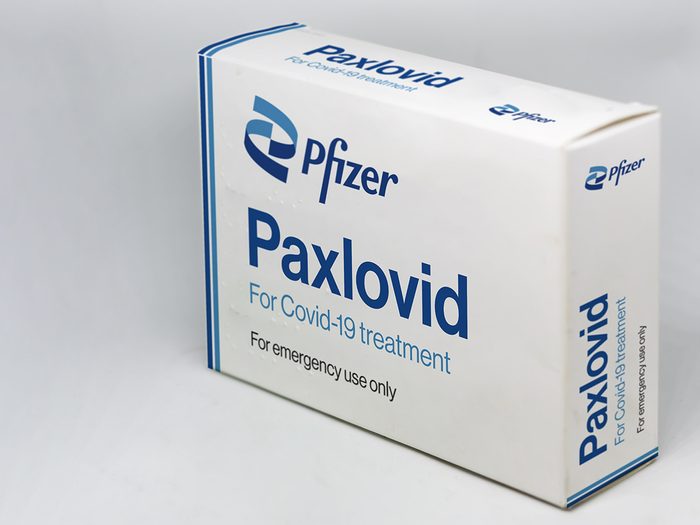Everything You Need to Know About COVID Antiviral Pills

On Jan. 17, Health Canada approved Paxlovid, Pfizer's antiviral COVID-19 pill. Learn how COVID antivirals work, potential side effects and more.
Until now, most COVID treatments were only available to people sick enough to require hospital admission or an oxygen tank. But all this will soon change with COVID-19 antiviral pills.
Two antiviral drugs—that can be taken as pills at home—have made headlines for significantly reducing hospitalizations when given in the early stages of COVID-19 infections.
In the COVID-19 pill race, Merck and Pfizer are the current frontrunners. Merck’s pill, molnupiravir, has already been authorized for use in adults in the U.K. In October, Merck also signed an agreement to share the formula for molnupiravir, allowing 105 low- and middle-income countries to manufacture and distribute the oral COVID-19 antiviral pill.
In November 2021, Pfizer released promising preliminary results for its pill, Paxlovid, an antiviral that works in combination with another drug called ritonavir. Pfizer also recently signed a deal with the United Nations that will allow drug companies in 95 countries to produce and distribute their antiviral. According to the press release, this deal could make Pfizer’s pill available to approximately 53 percent of the world’s population.
On Jan. 17, Health Canada approved Pfizer’s therapeutic “to treat adults with mild to moderate COVID-19 who are at high risk of progressing to serious disease, including hospitalization or death.” Paxlovid is the first COVID-19 therapy that Canadians will be able to take at home.
Working on the frontlines of the pandemic as an internal medicine physician in Toronto, I’ve seen the excitement around these drugs and heard from Canadians wondering how these COVID-19 treatment pills work, if they’re safe and when they might be available in Canada. The information is still evolving, but here is what we know so far.
How do antiviral COVID-19 medications work?
Generally speaking, viruses are tricky to treat because they hijack host cells and then use them to replicate. The problem is, it’s hard to interfere with the virus without harming human cells in the process. Viruses also mutate very quickly, making antiviral treatments less effective overtime. That’s why it’s much more likely you have been prescribed an antibiotic, but not an antiviral.
Antiviral drugs are generally not entirely new or even COVID specific. Merck’s pill, molnupiravir was originally developed to treat influenza. The antiviral treatment is a nucleoside analog drug, meaning it inserts errors into COVID’s genetic code, disrupting its ability to replicate. Theoretically, it only disrupts the virus’ RNA, leaving the DNA of human cells alone.
The Pfizer pill, Paxlovid, is a protease inhibitor—similar to drugs used to treat HIV and hepatitis C. It blocks an enzyme that the virus needs to multiply, but does not disrupt the genetic code of the virus. It is taken in combination with ritonavir, an older HIV drug that helps the Pfizer pill remain in the body longer.
Who could the Pfizer pills and Merck pills help?
In their trials, both Pfizer and Merck enrolled unvaccinated adults with COVID-19 who had at least one risk factor for severe illness, like advanced age or a pre-existing health conditions. As a result, these antivirals are currently intended for adults who are in the early stages of COVID-19 (within five days or less of symptom onset) with mild to moderate symptoms and who are well enough to remain home, but at risk of deteriorating and needing hospitalization.
These antiviral pills are currently being studied in different patient groups, like vaccinated patients, and in different contexts, like for post exposure prophylaxis. Depending on the results, the drug may be offered to more people in the near future.
(Related: If Omicron Is Rampant and Less Severe, Why Bother With Prevention at All?)
How well these COVID pills work?
For both the Pfizer pill and the Merck pill, preliminary results appear really promising for treating early COVID-19 and keeping patients out of hospital. Especially considering we currently don’t have any other options for treating early COVID-19.
Pfizer’s Phase 2/3 trial involving 2,246 adults showed a reduction of 89 percent in hospitalization compared to placebo when taken within three days of getting symptoms. Molnupiravir reduced hospitalization in at-risk patients by 50 percent when given within five days of the onset of symptoms. No deaths occurred in the treatment groups of both trials.
Though it’s tempting to compare the two drugs, it’s important to remember the different designs and timing of the Pfizer and Merck trials make head-to-head comparisons imprecise. Also, these results are specifically relevant for unvaccinated, high-risk patients. Anyone who was vaccinated, low risk or exposed without a proven infection was excluded from these trials. Anyone who was sick enough to need hospitalization was also excluded. So while these drugs show immense promise, these results are not applicable to everyone.

Are these COVID treatments safe?
Both Merck and Pfizer have reported minimal side effects, but neither has released detailed data to confirm these results.
That said, both drugs have features that limit who can safely take them.
Molnupiravir makes changes to the viral RNA. Even though human cells have DNA, there is some concern that molnupiravir could cause mutations in human DNA. If this occurs during fetal development, there is a potential risk of birth defects. Pregnant and breastfeeding women were excluded from the Merck trial. When authorizing the use of molnupiravir, U.K. health officials recommended it not be used in women who are pregnant or breastfeeding.
According to Health Canada, “While the benefits of Paxlovid were found to outweigh the risks, it can cause interactions with other medications for some patients. As such, patients should discuss the risks and benefits of treatment with their healthcare provider.”
Specifically, ritonavir, the drug given together with Paxlovid, has many possible drug-drug interactions and could interfere with many heart disease, pain and immune modulating medications. But because antiviral drug regimens are only five days, working around some of these drug interactions may be possible.
Are there any additional barriers?
These drugs work if they are given within days of developing symptoms. This might be a challenge to do in our existing system. Canada needs to ramp up access to testing and have accessible pathways to get a prescription for these drugs to work in a real-world setting.
Cost is a potential barrier. Because this is an outpatient medication, it might not be covered. For instance, a course of molnupiravir costs over $700 USD in the U.S.
Will these treatments work against COVID variants? Could the virus become resistant?
Theoretically, these drugs should be effective against known coronavirus variants. Merck has indicated that molnupiravir is effective against the delta variant. Researchers still need to demonstrate that these drugs will work against future variants.
Drug resistance is a common problem. In HIV, a combination of antivirals is used to combat resistance. We may need a similar strategy with COVID antivirals. Researchers will need to look closely at individuals who don’t respond to the drug and those who are immunocompromised to better understand if resistance is a major concern.
(Related: What Makes Omicron Different Than Other COVID Variants?)
Are COVID pills available in Canada?
Health Canada conducted an expedited review of Paxlovid in December 2021 and on Jan. 17 approved the antiviral drugs to treat Canadian adults with mild to moderate COVID-19. Officials are hoping to make the pills available “as soon as possible.”
(1/5) Health Canada has authorized the first #Covid19 treatment in pill form that can be used at home to help prevent serious disease. https://t.co/GbaFDrnAA2
— Health Canada and PHAC (@GovCanHealth) January 17, 2022
Merck’s Health Canada request for approval is still under review.
Remdesivir, an intravenous antiviral, is approved for use in Canada but is generally for sicker patients that are hospitalized.
With the COVID-19 pills available in Canada, do people still need to get vaccinated?
YES!
This antiviral COVID pill is not a substitute for vaccination. Vaccines prevent infection from happening in the first place and can stop or slow transmission. Because of this, immunization remains our most important defence.
(4/5) No drug, including PAXLOVIDTM, is a substitute for vaccination. Vaccination remains the most important tool in preventing serious illness from #Covid19 infection.
— Health Canada and PHAC (@GovCanHealth) January 17, 2022
These pills also don’t remove the need for other proven and effective public health measures, like masking, social distancing and ensuring adequate ventilation in indoor spaces.
Antiviral pills, as they have been studied so far, are given to prevent severe illness after someone has already contracted COVID. Where this would have the biggest impact is in the treatment of unvaccinated people. If we truly can prevent them from being hospitalized, we can conserve health care system resources and avoid delaying care or shutting down services for non-COVID patients. COVID pills are also a potential game changer for the large parts of the world that have minimal vaccine coverage.
So, while antiviral pills will be available to Canadians, it’s important to remember that these COVID treatments are not miracle cures. Instead, these treatments will be a helpful complement to vaccines and an important tool in our larger toolbox of COVID-19 defense.
Dr. Seema Marwaha is a general internal medicine physician in Toronto and an assistant professor at the University of Toronto’s Department of Medicine. She is also the editor-in-chief of Healthy Debate.
Next: Could Protection from COVID Soon Be Available Through a Nasal Spray?




